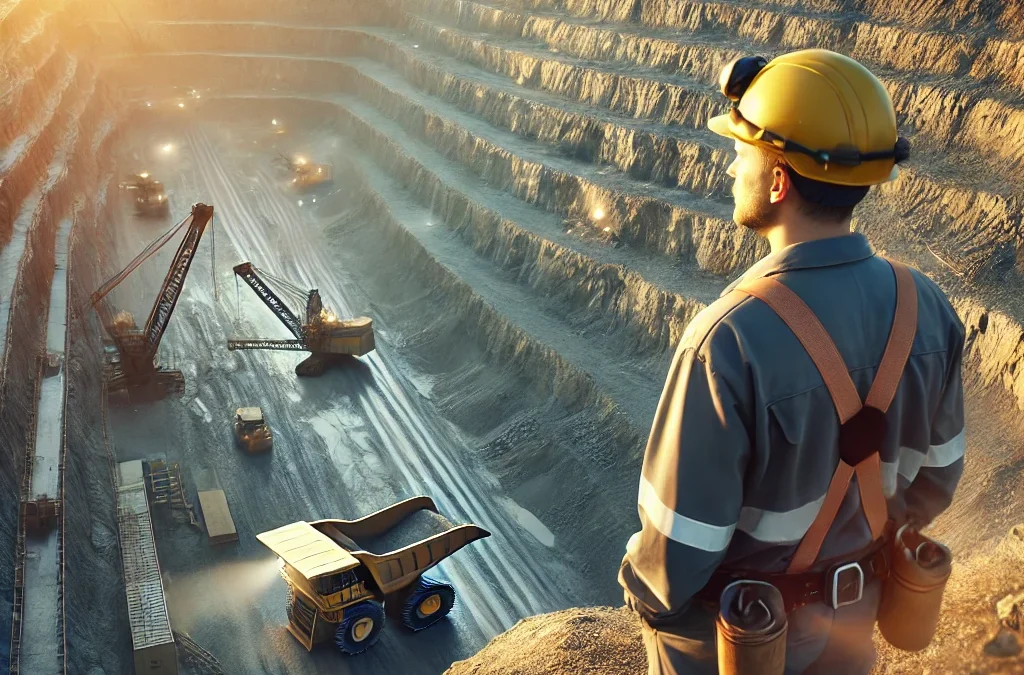Managing Stress Under the Open Sky
Opencast mining, with its vast landscapes and colossal machinery, presents a starkly different work environment from underground mining. While workers in opencast operations enjoy natural light and open spaces, they face their own set of mental health challenges. The pressures of tight deadlines, environmental hazards, and long hours can take a toll on mental well-being, often overshadowed by the visible physical demands of the job.
In this blog, we’ll explore the unique mental health challenges in opencast mining, their impact on workers, and actionable strategies to foster resilience and support.
The Mental Health Landscape of Opencast Mining
Opencast mining operations, often described as “industrial-scale marvels,” come with their own complexities. Here are some key challenges:
- High-Pressure Deadlines
- Meeting production targets often involves working under significant pressure, contributing to chronic stress.
- Weather conditions can delay operations, adding unpredictability to project schedules.
- Exposure to Environmental Extremes
- Workers contend with extreme heat, cold, dust, and noise, which can contribute to physical fatigue and mental strain.
- Prolonged exposure to harsh environments can lead to irritability and lower tolerance for stress.
- Isolation in Remote Locations
- Many opencast mines are in remote areas, leading to a sense of disconnection from family and community.
- The lack of social engagement outside work hours can exacerbate feelings of loneliness.
- Monotony and Repetition
- Operating heavy machinery or performing repetitive tasks can lead to boredom and a sense of stagnation, impacting motivation and mental health.
- Safety Concerns
- The risk of accidents involving large equipment or environmental hazards keeps workers in a constant state of vigilance.
- Witnessing or experiencing near-miss incidents can contribute to anxiety or trauma.
The Ripple Effects of Mental Health Challenges
Mental health struggles in opencast mining don’t just affect the workers themselves; they also impact their families, teams, and the broader operation. Common outcomes include:
- Increased Accidents: Stress and fatigue can reduce focus and decision-making ability, leading to workplace accidents.
- Lower Productivity: Mental health issues often result in reduced efficiency and engagement on the job.
- Strained Relationships: Workers dealing with stress may struggle to communicate effectively with colleagues or loved ones.
A report by the World Health Organization (WHO) emphasizes that untreated mental health issues can cost industries billions in lost productivity, underscoring the need for proactive interventions.
Practical Strategies for Workers
- Stay Physically Active
- Regular exercise can boost mood and energy levels, even if it’s a short walk during breaks.
- Stretching exercises help relieve tension caused by long hours in machinery or static positions.
- Practice Mindfulness
- Deep breathing exercises or short meditation sessions can help manage stress during high-pressure situations.
- Focus on what you can control rather than external factors like weather delays.
- Build a Support System
- Foster friendships with colleagues to create a sense of camaraderie and mutual support.
- Stay connected with family through regular calls or video chats, even during long shifts away.
- Set Small Goals
- Break down large tasks into smaller, manageable steps to reduce feelings of being overwhelmed.
- Celebrate small wins to maintain motivation and morale.
- Seek Professional Help
- Don’t hesitate to reach out to a counsellor or mental health professional if you’re feeling overwhelmed.
- Many organizations now offer Employee Assistance Programs (EAP’s) to provide confidential support.
How Companies Can Support Opencast Miners
Organizations have a vital role in fostering mental well-being among their workforce. Here’s how they can make a difference:
- Offer Mental Health Training
- Train supervisors and managers to recognize signs of mental health struggles and provide appropriate support.
- Create awareness programs to reduce stigma and encourage open conversations about mental health.
- Improve Working Conditions
- Invest in better safety protocols and ergonomic equipment to reduce physical strain.
- Provide shaded rest areas and adequate hydration stations to help workers manage extreme weather conditions.
- Promote Work-Life Balance
- Design schedules that allow for sufficient rest and recovery between shifts.
- Offer flexible work arrangements where possible, such as staggered shifts.
- Provide Access to Resources
- Make counselling services and mental health resources easily accessible, both on-site and remotely.
- Develop peer support programs where workers can share experiences and coping strategies.
- Recognize and Reward Contributions
- Celebrate workers’ achievements and recognize their contributions to the operation.
- Small gestures of appreciation can go a long way in boosting morale and creating a positive work environment.
Toward a Healthier Mining Culture
Opencast mining operations may take place under the open sky, but the pressures and challenges faced by workers can feel as heavy as the earth they move. By prioritizing mental health, both workers and organizations can create a culture where resilience and well-being are as valued as productivity and safety.
Remember, mental health isn’t just about surviving the shifts – it’s about thriving in the long run. Together, we can ensure that opencast miners not only meet the demands of their work but also lead balanced, fulfilling lives.

